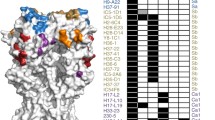Abstract
To find out whether immunoglobulins are able to recognize foreign antigens in the context of syngeneic MHC determinants, an effort was made to trigger the production of MHC-restricted antibodies by syngeneic Sendai virus (SV)-infected cells using the spleen-fragment culture technique. Antibodies were found that mimicked MHC-restricted antibodies by recognizing MHC + SV better than MHC alone. However, the binding was not specific for SV and also occurred on mitogen-stimulated (SV−) or influenza virus-infected cells. We describe the production of H-2 class I-specific lymphocytotoxic antibodies by primary B cells responding to syngeneic SV-infected cells. No viral-specific, H-2-restricted antibodies were found.
Similar content being viewed by others
References
Fellous, M., Kamoun, M., Gresser, I., and Bono, R.: Enhanced expression of HLA antigens and β 2-microglobulin on interferon-treated human lymphoid cells. Eur J Immunol 9: 446–449, 1979
Froscher, B. G. and Klinman, N. R.: Immunization with SV40-transformed cells yields mainly MHC-restricted monoclonal antibodies. J Exp Med 164: 196–210, 1986
Ivanyi, P. and de Greeve, P.: Individual mice of one inbred strain produce anti-H-2 antibodies of different specificities. In H. C. Morse (ed.): Origins of Inbred Mice, pp. 633–655, Academic Press, New York, 1978
Ivanyi, P., Melief, C. J. M., van Mourik, P., Vlug, A., and de Greeve, P.: Lymphocytotoxic antibodies by H-2 alloimmunization distinguish between MuLV-positive and -negative substrains of the same H-2 haplotype. Nature 282: 843–845, 1979
Kievits, F. and Ivanyi, P.: Monomorphic anti-HLA monoclonal antibody (W6/32) recognizes polymorphic H-2 heavy-chain determinants exposed by association with bovine or human not murine β 2- microglobulin. Hum Immunol 20: 115–126, 1987
Kievits, F., Rocca, A., Opolski, A., Limpens, J., Leupers, T., Kloosterman, T., Boerenkamp, W. P., Pla, M., and Ivanyi, P.: Induction of H-2-specific antibodies by injections of syngeneic Sendai virus-coated cells. Eur J Immunol 17: 27–35, 1987a
Kievits, F., Ivanyi, P., Krimpenfort, P., Berns, A., and Ploegh, H. L.: HLA-restricted recognition of viral antigens in HLA-transgenic mice. Nature 329: 447–449, 1987b
Kievits, F., Boerenkamp, W. J., and Ivanyi, P.: Searching for MHC-restricted antibodies: antibodies induced by injections with syngeneic cells coated with Sendai virus, trinitrophenyl (TNP) and xenogeneic beta-2-microglobulin are not restricted by the murine MHC. In P. Ivanyi (ed.): MHC + X, Complex Formation and Antibody Induction, pp. 38–49, Springer Verlag, Heidelberg, in press, 1988a
Kievits, F., Opolski, A., Boerenkamp, W. J., Pla, M., and Ivanyi, P.: Monoclonal H-2 class -I-specific antibodies isolated after immunization of C57B1/6 mice with syngeneic Sendai virus-coated cells. In C. S. Chella (ed.): H-2 Antigens: Genes, Molecules, Function, Volume 144, pp. 659–670, Nato ASI Series A: Life Sciences, 1988b
van Leeuwen, A. E., Goulmy, A., and van Rood, J. J.: Major histocompatibility complex-restricted antibody reactivity mainly, but not exclusively, directed against cells from male donors. J Exp Med 150: 1075–1083, 1979
Levy, R. G., Dower, S. K., Shearer, G. M., and Segal, D. M.: Trinitrophenyl modification of H-2k and H-2b spleen cells results in serological detection of Kk-like determinants. J Exp Med 159: 1464–1472, 1984
Liberti, P. A., Hackett, C. J., and Askonas, B. A.: Influenza virus infection of mouse lymphoblasts alters the binding affinity of anti-H-2 antibody: requirement for viral neuraminidase. Eur J Immunol 9: 751–757, 1979
Muller, C. P., Stephany, D. A., and Wunderlich, J. R.: Changes in mouse MHC expression during the cell cycle of ConA-treated spleen cells. J Immunol 136: 17–22, 1986
Opolski, A., Kievits, F., and Ivanyi, P.: Polymorphic and autoreactive H-2-specific monoclonal antibodies isolated after injections of syngeneic Sendai virus-coated lymphocytes. Immunogenetics 24: 402–408, 1986
Opolski, A., Degos, L., and Pla, M.: Sendai virus infection of tumor cells increases the production of autoreactive H-2-specific antibodies in syngeneic recipients. In P. Ivanyi (ed.): MHC + X, Complex Formation and Antibody Induction, pp. 66–71, Springer Verlag, Heidelberg, in press, 1988
Pestalozzi, B., Stitz, L., and Zinkernagel, R. M.: Monoclonal antibodies against viral determinants are not restricted to the K/D end of the MHC. J Exp Med 166: 295–299, 1987
Pla, M., Opolski, A., Rocca, A., and Degos, L.: Immunization with fibroblasts transfected with cloned retroviral DNA induced H-2-specific antibodies in syngeneic recipients. In P Ivanyi (ed.): MHC + X, Complex Formation and Antibody Induction, pp. 61–85, Springer Verlag, Heidelberg; in press, 1988
Schmidt, W.: H-2-specific antibodies induced by injection of syngeneic leukemia cells. Immunogenetics 25: 215–221, 1987
Sherman, L.: The influence of the major histocomatibility complex on the repertoire of allospecific cytolytic T lymphocytes. J Exp Med 155: 380–389, 1982
Tamminen, W. L., Wraith, D., and Barber, B. H.: Searching for MHC-restricted antiviral antibodies: antibodies recognizing the nucleoprotein of influenza virus dominate the serological response of C57B1/6 mice to syngeneic influenza-infected cells. Eur J Immunol 17: 999–1006, 1987
Tamminen, W. L. and Barber, B. H.: Searching for MHC-restricted monoclonal antibodies recognizing the determinants seen by anti-influenza virus cytotoxic T-lymphocyte receptors. In (ed.): MHC + X, Complex Formation and Antibody Induction, pp. 50–60, Springer Verlag, Heidelberg, in press, 1988
Wylie, D. E., Sherman, L. A., and Klinman, N. R.: Participation of the major histocompatibility complex in antibody recognition of viral antigens expressed on infected cells. J Exp Med 155: 403–414, 1982
Zinkernagel, R. M. and Doherty, P. C.: MHC-restricted cytotoxic T cells: Studies on the biological role of polymorphic major transplantation antigens determining T-cell restriction specificity. Adv Immunol 27: 51–177, 1979
Author information
Authors and Affiliations
Rights and permissions
About this article
Cite this article
Kievits, F., Boerenkamp, W.J. & Ivanyi, P. Immunization with syngeneic Sendai virus-infected cells induce no MHC-restricted antibodies but antibodies specific for H-2 class I determinants. Immunogenetics 29, 108–111 (1989). https://doi.org/10.1007/BF00395858
Received:
Issue Date:
DOI: https://doi.org/10.1007/BF00395858



